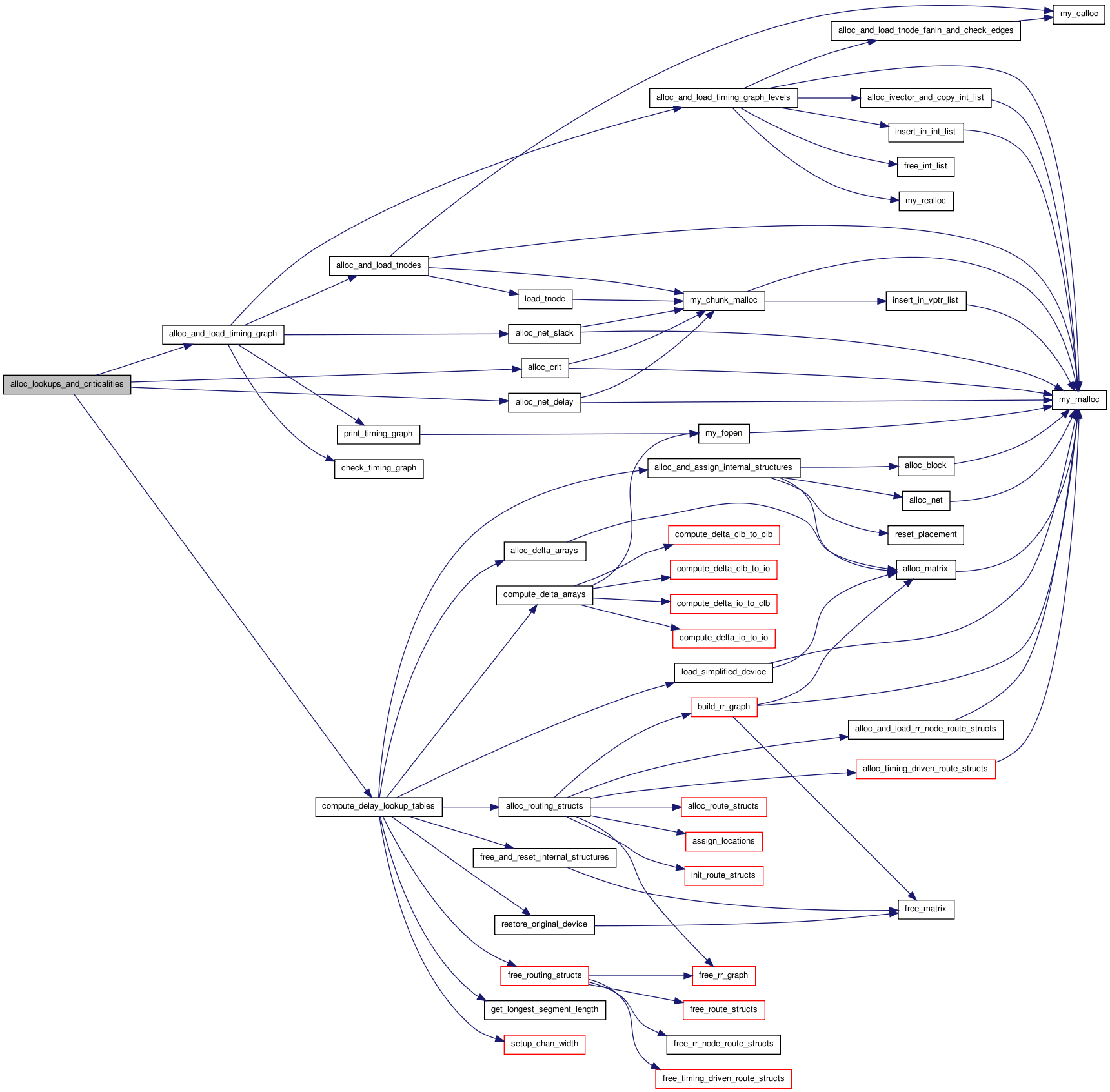#include <stdio.h>#include <math.h>#include "util.h"#include "vpr_types.h"#include "globals.h"#include "path_delay.h"#include "path_delay2.h"#include "net_delay.h"#include "timing_place_lookup.h"#include "timing_place.h" Include dependency graph for timing_place.c:
Include dependency graph for timing_place.c:Go to the source code of this file.
Functions | |
| static float ** | alloc_crit (struct s_linked_vptr **chunk_list_head_ptr) |
| static void | free_crit (struct s_linked_vptr **chunk_list_head_ptr) |
| void | print_sink_delays (char *fname) |
| void | load_criticalities (struct s_placer_opts placer_opts, float **net_slack, float d_max, float crit_exponent) |
| void | alloc_lookups_and_criticalities (t_chan_width_dist chan_width_dist, struct s_router_opts router_opts, struct s_det_routing_arch det_routing_arch, t_segment_inf *segment_inf, t_timing_inf timing_inf, float ***net_delay, float ***net_slack) |
| void | free_lookups_and_criticalities (float ***net_delay, float ***net_slack) |
Variables | |
| float ** | timing_place_crit |
| static struct s_linked_vptr * | timing_place_crit_chunk_list_head |
| static struct s_linked_vptr * | net_delay_chunk_list_head |
Function Documentation
| static float ** alloc_crit | ( | struct s_linked_vptr ** | chunk_list_head_ptr | ) | [static] |
Allocates space for the timing_place_crit data structure [0..num_nets-1][1..num_pins-1]. I chunk the data to save space on large problems.
Definition at line 31 of file timing_place.c.
{
float **local_crit; /* [0..num_nets-1][1..num_pins-1] */
float *tmp_ptr;
int inet;
int chunk_bytes_avail;
char *chunk_next_avail_mem;
*chunk_list_head_ptr = NULL;
chunk_bytes_avail = 0;
chunk_next_avail_mem = NULL;
local_crit = (float **)my_malloc(num_nets * sizeof(float *));
for(inet = 0; inet < num_nets; inet++)
{
tmp_ptr = (float *)my_chunk_malloc((clb_net[inet].num_sinks) *
sizeof(float),
chunk_list_head_ptr,
&chunk_bytes_avail,
&chunk_next_avail_mem);
local_crit[inet] = tmp_ptr - 1; /* [1..num_sinks] */
}
return (local_crit);
}
 Here is the call graph for this function:
Here is the call graph for this function: Here is the caller graph for this function:
Here is the caller graph for this function:| void alloc_lookups_and_criticalities | ( | t_chan_width_dist | chan_width_dist, |
| struct s_router_opts | router_opts, | ||
| struct s_det_routing_arch | det_routing_arch, | ||
| t_segment_inf * | segment_inf, | ||
| t_timing_inf | timing_inf, | ||
| float *** | net_delay, | ||
| float *** | net_slack | ||
| ) |
Definition at line 138 of file timing_place.c.
{
(*net_slack) = alloc_and_load_timing_graph(timing_inf);
(*net_delay) = alloc_net_delay(&net_delay_chunk_list_head, clb_net, num_nets);
compute_delay_lookup_tables(router_opts, det_routing_arch, segment_inf,
timing_inf, chan_width_dist);
timing_place_crit = alloc_crit(&timing_place_crit_chunk_list_head);
}
 Here is the call graph for this function:
Here is the call graph for this function: Here is the caller graph for this function:
Here is the caller graph for this function:| static void free_crit | ( | struct s_linked_vptr ** | chunk_list_head_ptr | ) | [static] |
Definition at line 61 of file timing_place.c.
{
free_chunk_memory(*chunk_list_head_ptr);
*chunk_list_head_ptr = NULL;
}
 Here is the call graph for this function:
Here is the call graph for this function: Here is the caller graph for this function:
Here is the caller graph for this function:| void free_lookups_and_criticalities | ( | float *** | net_delay, |
| float *** | net_slack | ||
| ) |
Definition at line 160 of file timing_place.c.
{
free(timing_place_crit);
free_crit(&timing_place_crit_chunk_list_head);
free_timing_graph(*net_slack);
free_net_delay(*net_delay, &net_delay_chunk_list_head);
}
 Here is the call graph for this function:
Here is the call graph for this function: Here is the caller graph for this function:
Here is the caller graph for this function:| void load_criticalities | ( | struct s_placer_opts | placer_opts, |
| float ** | net_slack, | ||
| float | d_max, | ||
| float | crit_exponent | ||
| ) |
set criticality values, returns the maximum criticality found assumes that net_slack contains correct values, ie. assumes that load_net_slack has been called
Definition at line 104 of file timing_place.c.
{
int inet, ipin;
float pin_crit;
for(inet = 0; inet < num_nets; inet++)
{
if(inet == OPEN)
continue;
if(clb_net[inet].is_global)
continue;
for(ipin = 1; ipin <= clb_net[inet].num_sinks; ipin++)
{
/*clip the criticality to never go negative (could happen */
/*for a constant generator since it's slack is huge) */
pin_crit = max(1 - net_slack[inet][ipin] / d_max, 0.);
timing_place_crit[inet][ipin] =
pow(pin_crit, crit_exponent);
}
}
}
 Here is the caller graph for this function:
Here is the caller graph for this function:| void print_sink_delays | ( | char * | fname | ) |
Definition at line 70 of file timing_place.c.
{
int num_at_level, num_edges, inode, ilevel, i;
FILE *fp;
fp = my_fopen(fname, "w", 0);
for(ilevel = num_tnode_levels - 1; ilevel >= 0; ilevel--)
{
num_at_level = tnodes_at_level[ilevel].nelem;
for(i = 0; i < num_at_level; i++)
{
inode = tnodes_at_level[ilevel].list[i];
num_edges = tnode[inode].num_edges;
if(num_edges == 0)
{ /* sink */
fprintf(fp, "%g\n", tnode[inode].T_arr);
}
}
}
fclose(fp);
}
 Here is the call graph for this function:
Here is the call graph for this function: Here is the caller graph for this function:
Here is the caller graph for this function:Variable Documentation
struct s_linked_vptr* net_delay_chunk_list_head [static] |
Definition at line 16 of file timing_place.c.
| float** timing_place_crit |
available externally
Definition at line 13 of file timing_place.c.
struct s_linked_vptr* timing_place_crit_chunk_list_head [static] |
Definition at line 15 of file timing_place.c.












